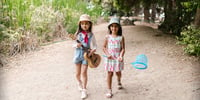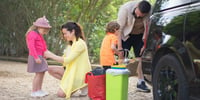PARENTING
Parent Mental Health Day: Tips to Protect Your Own Mental Health
- January 26, 2023
- In PARENTING
- 7 min read
If you're a parent, it's important not to forget to prioritise your own mental health. Here are some tips to help you protect your mind.
Help Your Kids Pack Their School Bags: Top Tips and PDF Checklist
- September 6, 2022
- In PARENTING
- 6 min read
Do your kids keep forgetting things for school? Here are our tips to help them pack their school bags so they're ready for the day ahead
18 Ways to Make their First Day of School Perfect
- August 26, 2022
- In PARENTING
- 10 min read
Their first day of school should be a special one. Click here to check out our 18 essential tips to make sure everything goes smoothly.
Everything You Need to Know About the EPQ: Full FAQ
- August 18, 2022
- In PARENTING
- 14 min read
With the potential for 28 extra UCAS points, the EPQ can be make or break for some universities. Read our guide for the extended project qualification
Back to School Clothing & Footwear Allowance 2022 (BTSCFA)
- August 16, 2022
- In PARENTING
- 9 min read
The Irish back-to-school clothing and footwear allowance helps to cover the cost of uniforms and footwear for eligible Irish school children. Read on to find out if you qualify and how much you could receive.
5 Simple Solutions to Tackle Back-to-School Anxiety in Teenagers
- August 11, 2022
- In PARENTING
- 11 min read
Back-to-school anxiety can be a big problem for teenagers. Read the best tips on how to fight back to school anxiety and let us help you!
Rainy Day in Birmingham: 10 Kid-Friendly Weatherproof Ideas
- August 10, 2022
- In PARENTING
- 5 min read
Check out this list of engaging activities for a rainy day in Birmingham that you (probably) haven’t done before – all with a focus on education and culture.
What are the cheapest and best summer camps in Birmingham in 2022?
- August 9, 2022
- In PARENTING
- 7 min read
Looking for the best summer camps for kids and teens in Birmingham this year? We’ve compiled a list of the best and affordable camps
Our Top 4 Outdoor Activities in / Near Birmingham for Kids
- August 8, 2022
- In PARENTING
- 6 min read
When the weather's good, don't miss out on these outdoor activities in / near Birmingham that are great for the whole family. Click here to find out more.
10 Unforgettable Day Trips Near Birmingham for Families
- August 5, 2022
- In PARENTING
- 5 min read
Need some ideas for family day trips near Birmingham? We’ve got some great suggestions that you might not have considered before…
The 10 Best Museums for Kids in Birmingham
- August 4, 2022
- In PARENTING
- 5 min read
Whether your kids love history, science, art or motorcycles, these are the best museums for kids in Birmingham and they’re fun for the whole family.
Great Museums in the Capital - What is the Best Museum for Kids in London?
- August 3, 2022
- In PARENTING
- 6 min read
Going to the museum is a great way to spend a day out with kids, but not all museums are kid-friendly. Check out our guide to the best museums for kids in London!
Your Guide to The Best Day Trips From London With Children
- July 27, 2022
- In PARENTING
- 6 min read
Are you looking for a great day trip from London with kids? Check out our top picks for destinations!
The Best Rainy Day Activities in London With Kids
- July 26, 2022
- In PARENTING
- 6 min read
A rainy day doesn’t have to be boring - check out our guide to the best rainy day activities in London with kids!
Have a Ball(pit) this Summer at the Best Soft Play in London
- July 25, 2022
- In PARENTING
- 7 min read
We’ve trawled through the ball pits so that you don’t have to and put together our top list of soft play centres in London to entertain the kids.



















